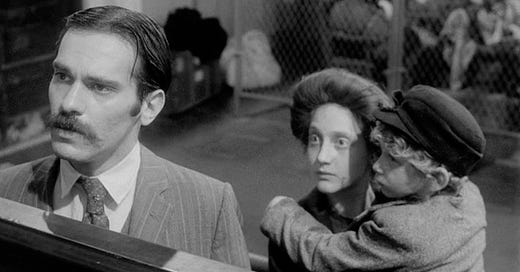Reeling Backward: Hester Street (1975)
Joan Micklin Silver's first feature film is a no-budget story about turn-of-the-century immigrants with a lot of heart and fantastic, unstudied performances.
“You wanna be an American, you gotta hurt.”
Joan Micklin Silver’s first feature film is like a tiny antique music box or curio: a small, perfect thing.
Turned down by most every studio around, it was filmed for $370,000, or about $2 million today — not enough for a streaming platform episode. Silver adapted the screenplay from Abraham Cahan’s novella, “Yekl: A Tale of the New York Ghetto,” centering on the thriving, messy community of immigrant eastern European Jews.
It’s probably best known today for being Carol Kane’s first leading film role, and one that scored her an Academy Award nomination for Best Actress — still her only one. She plays Gitl, a meek traditional Orthodox Jewish wife brought over the States by her husband, a cad named Jake (Steven Keats) who has fully assimilated into American life and is resentful of her backward ways.
Cohen Film Collection has recently released a new 4K restoration on Blu-ray that is worth checking out.
Aside from Kane’s terrifically empathetic performance, the thing that immediately struck me about “Hester Street” is its unerring authenticity. Silver masterfully recreates the bustling streets of the 1896 immigrant sector, with life teaming everywhere in all its chaotic glory: peddlers hocking their wares, children playing, women and men going to and fro from their factory jobs to their dingy, cramped apartments — and counting themselves lucky to be in America.
Shot in black-and-white (cinematography by Kenneth Van Sickle), the film keeps its view at a tight eye level, so we only see smaller slices of this sprawling society at a time. No doubt inspired by budget restrictions, the resulting feel is intimate and familial. We brush up against these people living in squalor but buoyed by hope, become immersed in how they dress and what they eat.
Large chunks of the movie play out in Yiddish with subtitles, and it all sounds like the cast really sank their teeth into the language (at least to these goy ears). Gitl stars out the story speaking no English, and by the end is pretty well fluent.
Jake had already come over from Russia some years earlier, and is the top worker at the sewing factory pulling down a handsome $12 a week. (About $405 today.) He wears sharp modern suits and hats, enjoys drinking and carousing at the bars, and has a side gig working evenings at a dancing academy, where all the ladies want to dance with the dashing bachelor.
Except Jake (adapted from Yekl) is married to Gitl and they have a son of about 4 or 5, Yossele. Apparently he has left them in his father’s care back in the home country while he stakes his claim in America, and at this point has fairly forgotten about his duties. He freely carries on with various ladies, including Mamie (Dorrie Kavanaugh), who thinks Jake is a marriage prospect.
When his father dies, Jake is forced to bring his family over, much to his dislike. He’s genuinely pleased to be reunited with his son, whom he soon redubs Joey, but is extremely displeased with his wife, who is bound up on orthodox traditions like always keeping her hair covered by a scarf or wig.
Jake is very much a new American on the make, and has little patience for greenhorns or “greeners” with Old World sensibilities and traditions. He refuses to be intimate with Gitl, and continues to carry on with Mamie all the way.
He also borrowed $25 from his erstwhile girlfriend to buy the furniture in the apartment where he had been a boarder, sleeping on a cot in the kitchen. He brings in a coworker, a devout scholar named Bernstein (Mel Howard), as is boarder at $2 a week. The man even throws in Hewbrew lessons for Joey.
It isn’t exactly a surprise where the story turns out. Gitl, at first the oppressed little wife who clings to her old ways, gradually starts to come out of her shell and asserts herself. She gets some help from nosy neighbor Mrs. Kavarsky, played by Doris Roberts, best known as the matriarch from “Everybody Loves Raymond.”
She encourages Gitl to find her backbone while protecting her from Jake’s worst impulses, which brush right up against physical and emotional abuse.
Some unexpected things happen. As Gitl and Jake grow closer and closer to an irrevocable split, she finds an attraction growing with Bernstein. Of course, he will not act upon it, as this would fall into the area of coveting another man’s wife, so it’s up to her to overcome orthodoxy and make the first move.
Things wind up on something like a hopeful note. Having extracted $300 of Mamie’s money in the divorce settlement, Gitl and Bernstein make plans to set up a grocery story that she will run while he returns to his scholarly teaching. Meanwhile, Mamie and Jake want to set up a dancing academy of their own, though they’ll have to start saving their money again.
“Hester Street” is sentimental, but not in a maudlin or tear-jerking way. It invites us into this little community of immigrants, immerses us in their culture and personalities, and by the end we understand their hopes and despairs.





